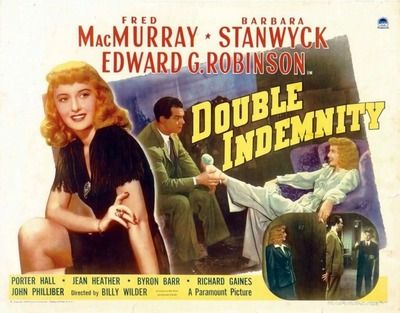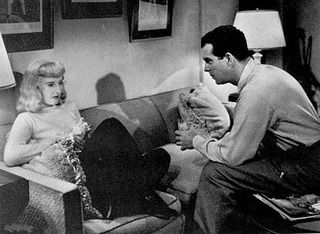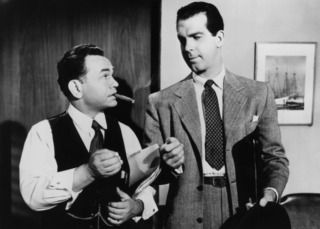
Double Indemnity
1944
Director: Billy Wilder
Starring: The immaculate Barbara Stanwyck, Fred MacMurray, Edward G. Robinson
It’s hard for me to write about Double Indemnity because I love Double Indemnity so damn much that I have essentially no capacity to speak about it lucidly or objectively. All I can do is wildly flail my long fangirl arms and screech about how it’s pretty much the best movie ever made. There. I’ve warned you.
Walter Neff (MacMurray, in a non-Disney Dad role) is an insurance salesman who seems to be having a bad night. He stumbles to his office where he dictates a message to his friend and boss Barton Keyes (Robinson). The story he tells is one of meeting Phyllis Dietrichson (Stanwyck) when he was renewing her husband’s policy. Phyllis seduced Walter and convinced him to help her kill her husband and, as you may have already guessed, things head downhill for everyone.
Plain and simple, this is the most perfect film noir ever made. There are so many classic noir-isms that Wilder either establishes or perfects in Double Indemnity: the femme fatale, the fundamentally-good-but-fatally-flawed hero, the shadowy lighting, the sexual power trips, the hard-boiled dialogue, the symbolism, and even the names. Noir has great names, and this movie has some of the best: Walter Neff? If that name doesn’t scream “pushover,” I don’t know what does. You don’t doubt Neff falling for Phyllis and succumbing to her every whim when he has a name like that.
Funnily enough, for all that it contributes to classic noir-isms, something that differentiates Double Indemnity from other classic films noir is the fact that its story is straightforward. Most noirs are known for having more plot twists than a pretzel; Double Indemnity doesn’t indulge in tangential plot lines, bizarre twists, or more characters than you can keep track of. In a way, that makes it even better. Instead of spending your time trying to figure out what just happened in the story, you can sit back and enjoy the seedy, shadowy world that Wilder has created. It’s about atmosphere, not random twists.

Oh my word, but the dialogue has some of the best hard-boiled lines ever written. There are so many gloriously embittered quotes, like “How could I have known that murder could sometimes smell like honeysuckle?” and “I killed him for money, and for a woman, and I didn’t get the money, and I didn’t get the woman. Pretty, isn’t it?” “Straight down the line.” But my favorite line from the movie, and perhaps my most oft-quoted line from ANY film EVER, my go-to quote when people occasionally ask me my favorite movie quote, is from an early exchange between Walter and Phyllis. They have been darkly flirting with one another. He makes a more straightforward sexual advance, and she says, “I wonder if I know what you mean.” To which he replies, “I wonder if you wonder.”
*Pardon the interruption, but Siobhan’s head exploded just THINKING about that line*
Seriously, that’s just about my favorite line from cinema, full stop. I love that line. To me, it represents everything that film noir is all about, all wrapped up in two gorgeous sentences. Sexuality, both hidden and overt, double entendres, nothing being taken at face value, darkly sinister relationships… GAH! Ridiculous fangirl flailing ensues every time I hear those lines.
I admit to having a bit of a girl crush on Barbara Stanwyck, and it’s mostly because of this movie. Phyllis Dietrichson is so slick, so smart, so willing to use her feminine wiles to get exactly what she wants. She’s awesome. I’ve said it before, but I’m a nice person in real life. I’m a “play by the rules” kind of gal – always have been, always will be. However, I get a vicarious thrill by watching mean people doing mean things to each other in the movies, and Phyllis is one of the best examples of this. She’s so damned powerful and cutthroat. I love her. Just plain, flat out, love her. (And therefore, I also love Barbara Stanwyck by extension.) Take the scene where she and Walter have sex for the first time. OK, so you don’t actually see them having sex – this was 1944, after all – but the camera does the traditional pan away to blowing curtains, and then we cut back to the couple on the sofa. She is reapplying her lipstick – giggle. And then she is wearing pants. She is the one who wears the pants, both literally and symbolically, in that relationship.
As much as I adore Phyllis/Stanwyck, the most likeable character in the film is that of Barton Keyes, Neff’s boss, played to perfection by Edward G. Robinson. Keyes is certainly a supporting character, but he’s the moral compass of the film, the sounding board off which Neff’s increasingly amoral activities are thrown into stark contrast. As legend has it, Robinson originally didn’t want the role because it wasn’t a leading part, and Edward G. Robinson is always the lead. He had to be convinced; thank goodness he eventually signed on. The Keyes character is an unusual one in the world of noir. While it’s not unusual for our hero to have a best friend more moral than he is, it IS unusual that said best friend be as entertaining and as sharp-witted as Keyes. Most of the best friend characters are utter saps; boring, dull, merely there to provide a moral contrast, no backbone whatsoever, inherently wimpy. If they’re not saps, then they are simply plot points, killed early on to provide motivation for our “hero” to avenge their death. Keyes is none of these things; Keyes has a bite. He’s certainly less of a felon than Neff, but his character hardly seems lily-white. Watching him slowly piece together the crime at the heart of Double Indemnity is nearly as enthralling as the crime itself. Normally, you either root for the bad guys to get away with it or you root for the good guys to catch the bad guys; in Double Indemnity, I root for everyone, because all the characters are so well written and so much damn fun.

What’s more, the Walter Neff-Barton Keyes friendship is one of the earliest cinematic examples of a bromance. Heck, they even say “I love you” to one another, and on multiple occasions. Their relationship is far more meaningful than that between Phyllis and Neff, and the final scene of the film between Neff and Keyes is surprisingly poignant and emotional. It’s a far stronger ending than the originally planned jail sequence, and significant that Wilder ends the film, which is so much about Phyllis’ seduction, with a shot of the two men.
I had the immense pleasure of seeing Double Indemnity on the big screen a few years ago, and I brought along my sister and my husband with me. Now, my sister dabbles in classic film so I had no doubt she would enjoy herself, but my husband has precious little interest in this sort of movie. He came because I had been ranting and raving about Double Indemnity so much at home that he felt it would be a good opportunity to see what I was fussing about. It’s an understatement to say I was nervous about his reaction to the film. He doesn’t regularly watch older movies, he doesn’t regularly watch black and white, he’s never really seen an old-school film noir… I was nervous. I really needn’t have been. He was chuckling continually at all the double entendres (an effect, by the way, which was magnificently magnified by seeing it with an audience) and when it ended, he admitted to really liking it. Which made me breathe a huge sigh of relief, but also marvel at Double Indemnity’s timelessness. My husband is used to modern films, and he enjoyed this classic. What a film Billy Wilder managed to make – one that has clearly endured the ravages of time to be just as fresh and fun and dangerous today as it was when it was made.
I’ve mentioned a couple of times, in other noir reviews, that film noir wasn’t a genre I appreciated immediately. I watched the great ones, the classic ones, and thought, “meh.” But over time, something changed, and I got addicted. What I haven’t mentioned before is that Double Indemnity is the primary reason for that change. I was writing a thesis at home (incredibly tedious work), and I put on Double Indemnity in the background (somewhere along the way I had the presence of mind to buy it on DVD). The movie would play, I would type, the movie would end, and then instead of breaking my groove by getting up from the computer, I would simply hit “play” again. And again. And again. (I really like rewatching movies.) Well, a week or so of that, and my thoughts on noir started to change. The atmosphere started getting through to me over the story. I started really listening to that dialogue, that great crackling dialogue, and I started getting excited about it. Double Indemnity is THE film that changed my mind about noir.
Above all else, above all the noir standards and terrific acting, the biggest thing I think of when I watch Double Indemnity is “perfect.” Just perfect. It’s my perfect movie. I can think of no way that it could have possibly been improved. I get happy when I talk about it, I get a thrill just thinking about it, and I could watch it every day and never get tired of it. It’s just… perfect.
Arbitrary Rating: 10/10. You better believe it, baby. Right down the line.
Good review. I will disagree on only one thing - this being the perfect noir.
ReplyDeleteFeel free to call me superficial, but the one flaw for me is that I didn't feel Stanwyck was sexy enough to believably draw MacMurray's character into her web and get him to commit those crimes. Perhaps it's because I'm not predisposed to commit crimes for someone else, so I figure in order to convince me to do it we'd have to be talking someone REALLY good looking. (Jane Greer in Out of the Past was believable.)
It's like in Fatal Attraction where I just couldn't buy Douglas' character having an affair with Glenn Close's when he had Anne Archer right there.
Of course, I worked with a woman who didn't buy Dangerous Liaisons because she just didn't believe John Malkovich was handsome enough to play a seducer of women, especially one as pretty as Michelle Pfeiffer, so it works both ways. (I did point out to her that Malkovich and Pfeiffer reportedly dated for a while after filming was done.)
Wow, knocking down Barbara Stanwyck! It's okay, Chip, I won't kill you for it. ;)
DeleteHaven't seen Fatal Attraction yet.
My big, rather enormous, and fairly irreversible problem with Dangerous Liaisons is that I saw Valmont first and completely fell in love with it. Colin Firth > John Malkovich. And yes, Annette Bening > Glenn Close. Let alone all the smaller parts! Ugh, I don't know, I probably owe Dangerous Liaisons a second go, but I just totally dig Valmont.
Oh, and John Malkovich is many things; sexy ain't one of them. So AGREED with your colleague on that one.
I love your review, Siobhan, and I can clearly see why you love this film. It is also true that the dialogue trancends reality and becomes believable only in an imaginary noir world and that is okay with me. My problem with the film however is exactly the same as mentioned by Chip. Stanwyck is hot, but Stanwyck as Phyllis is a viper and she reeks, Walter smells it from the beginning, yet somehow she wins him over. I do not think it is something about a weakness for controlling women, that is not the vibe I get. This is something about a feminine magic that I just do not see in Phyllis. A Lauren Bacall magic maybe. For Walter to fall for her seems against his nature, name or not, and it makes me scream idiot at him.
ReplyDeleteBut that is also the only fault I can find in this film. Robinson is magnificient.
I love Robinson so much. I'm so glad he did this film. He's easily the most likeable character.
DeleteAnd as I responded on your post for Double Indemnity, I think Walter's seduction is not about sex but about money. Phyllis plants the evil seed in his mind about getting away with murder and taking the money, and that is what seduces him, not her rockin' bod.
Dammit, I love this movie!!!
hermes
ReplyDeletesupreme new york
yeezy boost
nike sneakers for men
supreme clothing
louboutin
adidas stan smith shoes
goyard handbags
jordan sneakers
hogan outlet online